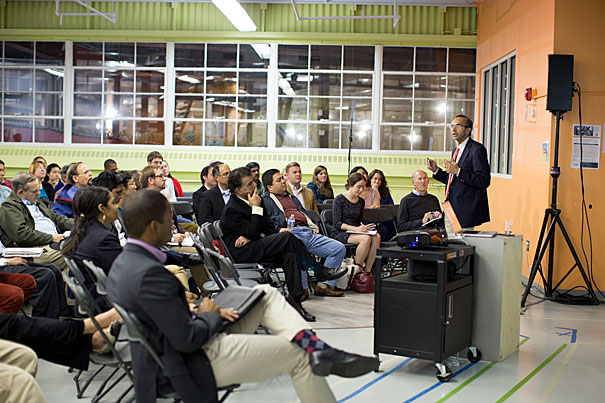
In a talk at the Ed Portal, Jorge Paulo Lemann Professor at Harvard Business School and South Asia Institute Director Tarun Khanna said that thinking globally opens up whole new ways to approach problems — if the entrepreneur has the vision to recognize them.
Rose Lincoln/Harvard Staff Photographer
HarvardX course closes in on global view
Professor describes benefits of health care, entrepreneurship, and economies
For Tarun Khanna, the Jorge Paulo Lemann Professor at Harvard Business School and director of the South Asia Institute, aspiring entrepreneurs could learn a lot from the Kumbh Mela.
Held every 12 years, the Hindu pilgrimage attracts 120 million people over a 45-day period, the equivalent of about one-third of the U.S. population. Even more astonishing, Khanna said, the “tiny city” that hosts the event “doesn’t even exist until the river recedes,” revealing the land that will welcome and host millions of Hindus and visitors. It is considered the world’s largest “pop-up city.”
Speaking before a crowd of 75 people at the Harvard Allston Education Portal (Ed Portal), Khanna explored the benefits of interdisciplinary problem-solving of complex health problems on an international scale, based on the HarvardX course “Entrepreneurship and Healthcare in Emerging Economies,” which he is co-teaching with Professor Sue J. Goldie, Roger Lee Irving Professor of Public Health at the Harvard School of Public Health (HSPH), director of its Center for Health Decision Sciences, director of the Global Health Education and Learning Incubator at Harvard University, and special adviser to the provost on global health education and learning. That enormous scale points out “what being an entrepreneur is all about,” he said. “When you begin to think about solving problems, you need an entirely different approach. You need to think on a much larger scale.”
A global world view, Khanna said, opens up whole new ways to approach problems — if the entrepreneur has the vision to recognize them. He suggested that maintaining the broad view, while focusing on specific actions, was essential to approaching the problem. In developing countries, often, whole systems need to be created to achieve the broad vision.
Just as Khanna and Goldie’s massive open online course (MOOC) will bring together learners from across the globe, the lecture brought together local learners for an in-person discussion. The lecture was the first of a three-part HarvardX for Allston series at the Ed Portal this fall. The two remaining discussion groups, scheduled for Nov. 12 and Dec. 3 at the Ed Portal, will explore entrepreneurial-focused case studies from the course, guided by Harvard teaching fellows.
Krishna Mangipudi, who traveled from Nashua, N.H., to hear Khanna speak, attended because he and a partner are interested in exploring entrepreneurial ventures in health care.
“This event is great, because it helps you think about what will make you successful, and how you need to think and what you need to consider to drive your vision forward,” he said. “Knowledge is no one person’s domain, and sharing it with the community like this only multiplies the experience for everyone. The idea to bring HarvardX into a series of lectures like this — I’m very happy to see it happen.”
Robert Lue, faculty director of HarvardX, faculty director of the Ed Portal, and professor of the practice of molecular and cellular biology, said that the lecture emphasized the importance of “in-person experience” in online education.
“What we’re experiencing tonight — HarvardX for Allston — represents an effort to leverage the investments Harvard is making, in terms of online education and making educational materials largely available to the world, but doing so in a way that does not seek to replace in-person interaction,” he said. “Online education was never meant to substitute the in-person experience. The principle is that online education is meant to create new opportunities for people to come together, to share, and to experience each others’ perspectives in new and exciting ways.”
Ultimately, Khanna said, having a “partnering mindset and a degree of self-assurance” are two qualities that will always serve an aspiring entrepreneur well. The first reflects “a basic recognition that ultimately, there’s no way you can have all the answers,” he said. “You need a coalition of people to (help you) address those things.
“A degree of self-assurance also helps so that when you fail — which is nine times out of 10 — you can get up and try one more time.”
For more information on the upcoming discussion groups, visit the Ed Portal’s website.




